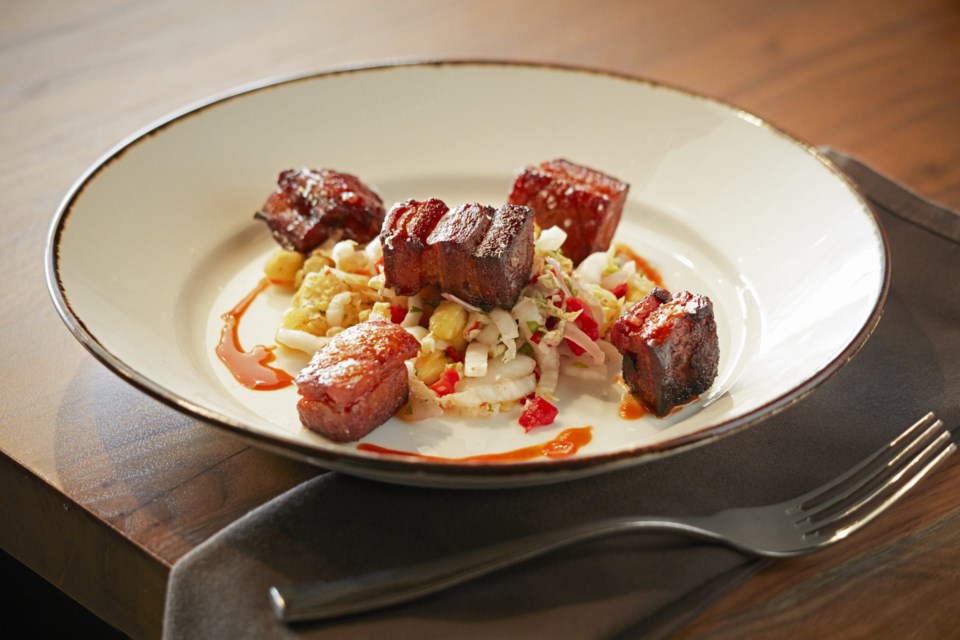In Big Spring, when Stephan Pyles was a child, his family ran a few restaurants in West Texas. One of them, the most successful one, was the Philips 66 Truck Stop Café. It was a bustling, family place in its day, churning out chicken enchiladas and beef tacos, tamales: West Texas roadside food. Even at age eight, he looked forward to the weekends, when he helped bus tables, or watched his mother, the pastry chef, turning flour and sugar into cakes, cobblers and cream pies. Food, he suggests, was always in his blood.
Big Spring also had an iconic honky tonk ballroom on its outskirts, The Stampede. It was opened in 1954 by Hoyle Nix, was the definitive West Texas cowboy and a king of Western Swing; Hoyle Nix wrote and recorded “Big Ball’s in Cowtown” in 1949, before Bob Wills picked it up. Every Saturday, Hoyle held court with his fiddle and boots. The Stampede drew people from all over West Texas. It is still going today, only now, it’s been passed down to son Jody Nix.
When Chef Stephan Pyles thinks about his childhood in Big Spring, those two places come to mind, the Phillips 66 Truck Stop Café, and The Stampede.
In houses, at Sunday dinners, in family-owned diners, there has existed good food in America for a long time. But in the ’40s, began a decades-long trend toward modern convenience. At its most basic, it was intended to help the housewives of middle class America, as Stephan explains. With the rise of vacuums and washing machines, came boxed cake and frozen TV dinners. The reputation of American food was that it was mass-produced for convenience, whereas any fine dining in the country was imported from Europe. It was French. Italian. “Continental.”
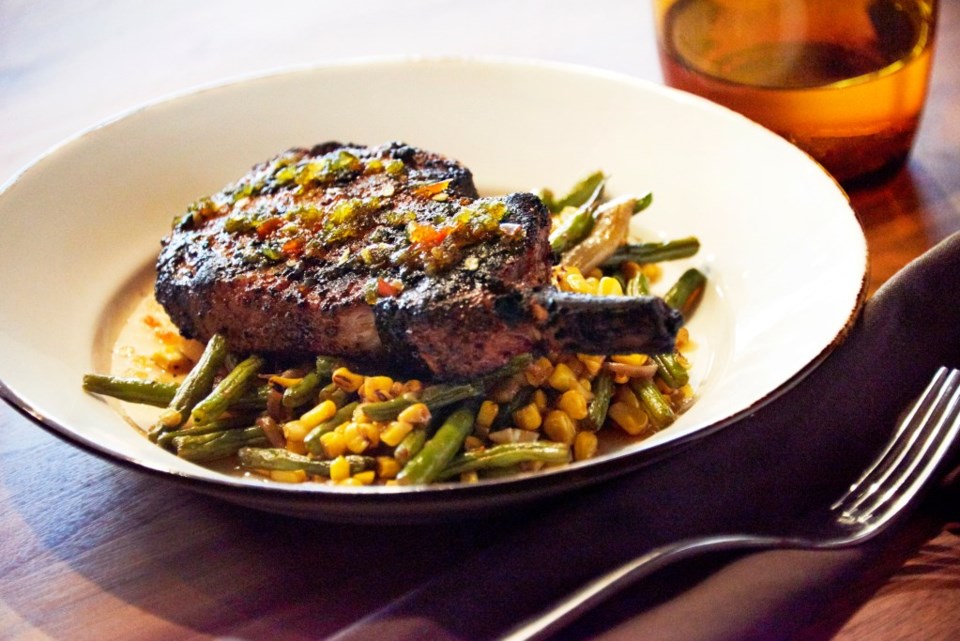
And yet, Stephan remembers the comfort of his grandmother’s fried chicken. How she marinated it in honey and vinegar overnight. He watched her dip it in flour and buttermilk and fry it low and slow; honey, he learned from her, caramelizes and burns easily, so the temperature has to stay low. It takes 30 minutes to fry honeyed chicken just right. He remembers flour-dusted days in the kitchen of a Mississippi woman named Mable, who he thought of as a second mother, and taught him the secrets of buttermilk biscuits. He still uses her recipe today. There was always good food in America, but it wasn’t being recognized, and in fine-dining restaurants, it wasn’t being served.
The first time he ever left the State of Texas, Stephan—who shocked his parents with a degree in music—went to France, and had what he describes simply as, “an awakening” regarding haute cuisine. He came back without money for culinary school, bought every cookbook he could afford, and took on an apprenticeship.
In the early ’80s, he got his “big break.” He was invited to The Great Chefs of France Cooking School at the Mondavi Winery, where he and other aspiring chefs assisted the premier chefs of the era: Michel Guerard, Jean and Pierre Troigros, Alain Chapel, Paul Bocuse and Gaston LeNotre. Right off the bat, Stephan was assigned to Julia Child.
“No pressure,” Stephan laughs.
He’s looking back, almost 40 years later, from a table at his 23rd restaurant, Flora Street Café. In its inaugural year, it was named the best new restaurant in Texas, and one of the top 100 in the country.
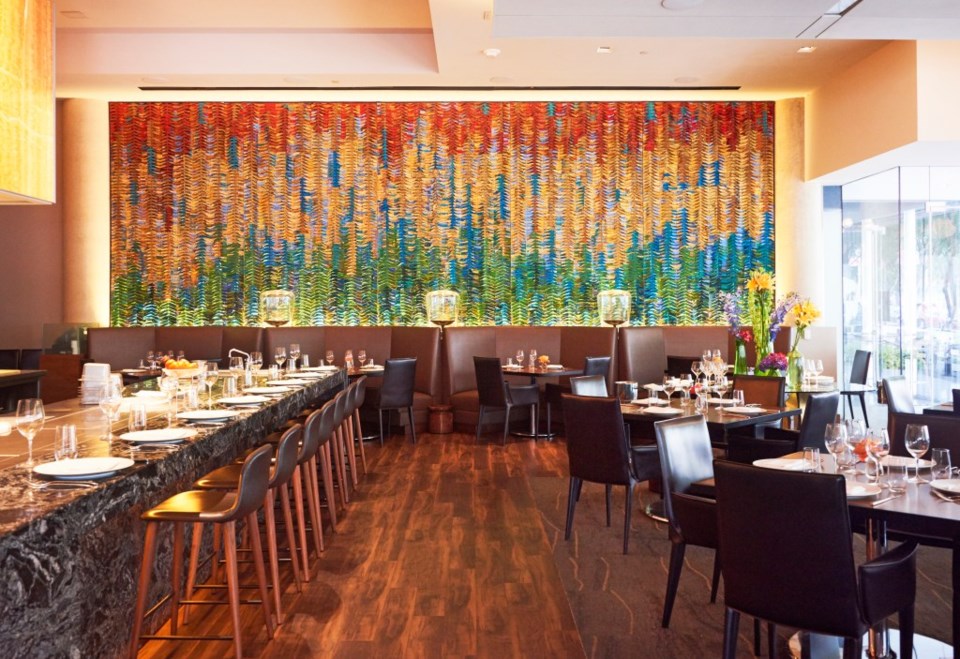
Like practically every concept with Stephan Pyles’s name on it, Flora Street Café was instantly an institution; when both tourists and celebrities come into town, Flora Street Café is always on their shortlist. For example, Martha Stewart dropped by one evening when she was in town, where she sat at the chef’s counter, drinking tequila on the rocks, and conversing with the chefs. Working for Stephan Pyles is gold on any chef’s resume, and many of the rising culinary stars of DFW today have grown up in one of his kitchens.
He opened Routh Street Café in 1983, and the rest of his career followed a natural progression. Over the years, he has also become known as a philanthropist. He is a founding board member of Share Our Strength, an international hunger relief organization, and in 1988, he also co-founded The Hunger Link, a Dallas-based program that acts as a link between restaurants and hotels with perishable food to spare, and ministries and soup kitchens in need. Stephan is also a life-long board member of the North Texas Food Bank, and he has served on the board of Goodwill Industries and The Art Institute as well. That’s not to mention the Stephan Pyles Culinary Scholarship, for culinary students in Texas. He was also the first chef in Texas to ever win the coveted James Beard award.
Stephan Pyles has opened restaurants in six different cities, but his first restaurant was on Routh Street Café, not far away from where Flora Street Café stands today. He always comes back to Dallas.
Read more: Chef Misti Norris is revolutionizing food at Petra and the Beast
The opening of Routh Street Café was kismet; in the ’80s, American haute cuisine was entering its first real moment. Other chefs—Dean Fearing, Bobby Flay, Robert Del Grande, Mark Miller—were in different places in the Southwestern United States, but they were doing remarkably similar things. They all could smell the change coming.
Ask Stephan and he’ll say it wasn’t on purpose. There weren’t “celebrity” chefs then. To him, a chef was a fry cook with a floppy hat and a cigarette.
“I knew something was happening in the country. There really weren’t great [American] restaurants,” he explains. “The good ones were French, continental. Nothing clearly American.” But he and a select group of chefs were hungry for American fine dining, for a return to roots, to local sourcing, and they were creating it by applying respected French techniques to the ingredients of their childhood. They were determined to bring American fine dining into the light.
At Routh Street Café, Stephan was still serving tacos, enchiladas, tamales. Only now, they were lobster tacos enchiladas, and foie gras tamales. Patrons of the restaurant came back, raving about the deep red of his smoked tortilla soup, and Heaven and Hell cake, angel food cake layered with devil’s food, with a generous layer of peanut butter mousse (purgatory) in the center. It wasn’t long before the press was raving about this nascent American cuisine, which they dubbed “Southwestern” cuisine.
It blazed like a wildfire, one that is still burning today. Most fast-casual restaurants have some remix of a “Southwestern” salad with tortilla strips, corn and spicy ranch. The movement has spawned sprawling chains like Chili’s, which sprang out of Dallas and landed all over the country. Their distinctive logo, a chili, is synonymous with Southwest eggrolls stuffed with corn and black beans. Skillet queso, quesadilla salad, fajitas served sizzling at the table: that is shorthand Southwestern cuisine that can be scribbled, copied, and pasted.
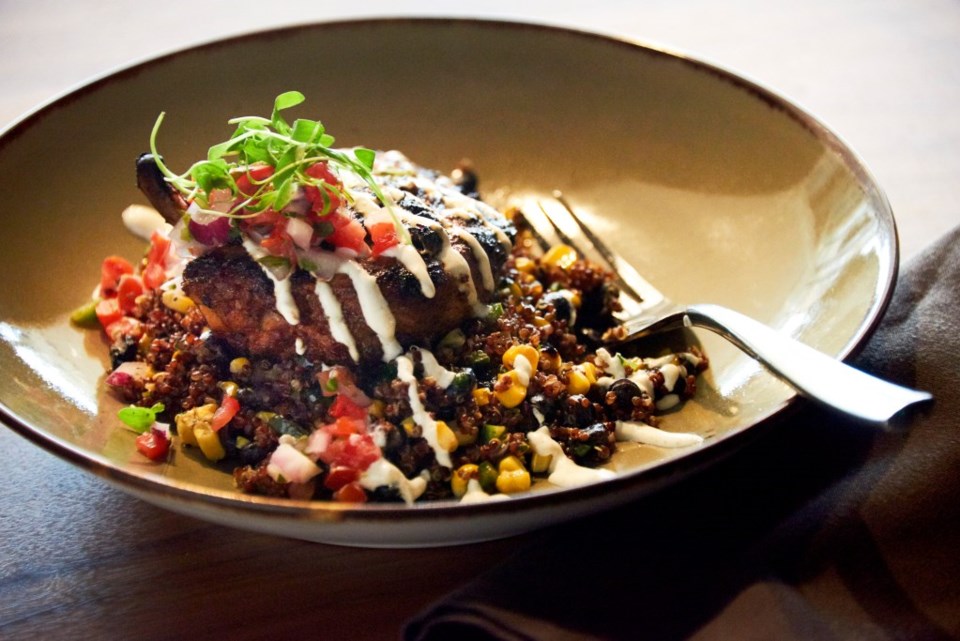
True Southwestern cuisine is a mix of Native American and Hispanic influences, marked by a reverence to chilies both green and red, blue corn and squash. Because this is Texas, our versions tend to include an abundance of beef too.
It was an impeccable blend of Stephan’s childhood and professional experiences. However, in the years since then, Stephan sharpened his focus on Texas. His particular style of Southwestern cuisine naturally progressed into something new, dubbed Modern Texas cuisine.
As described by former Dallas Morning News food critic, Leslie Brenner, “Modern Texas cuisine is what happens when creative chefs with contemporary Texas sensibilities create dishes using Texas ingredients and traditional Texan cooking techniques.”
It’s usually as simple as regional meat, rabbit or local beef, masa, chiles, local peaches or the crisp glory of a Texas pecan. Then, it’s whipped into a new kind of dish, one with a robust flavor that swells and flows, unfolding in one place, and ending up in another. Stephan loves modern, inventive cooking techniques that push the barrier, finding new ways to capture old flavors. Then it comes to your table: recognizable, homestyle food that has been folded, pressed and primped into something you’ve never seen before. It’s the same magic that turns paper into cranes.
More simply, when he works with his chefs, he always asks one question: “What makes it Texas?”
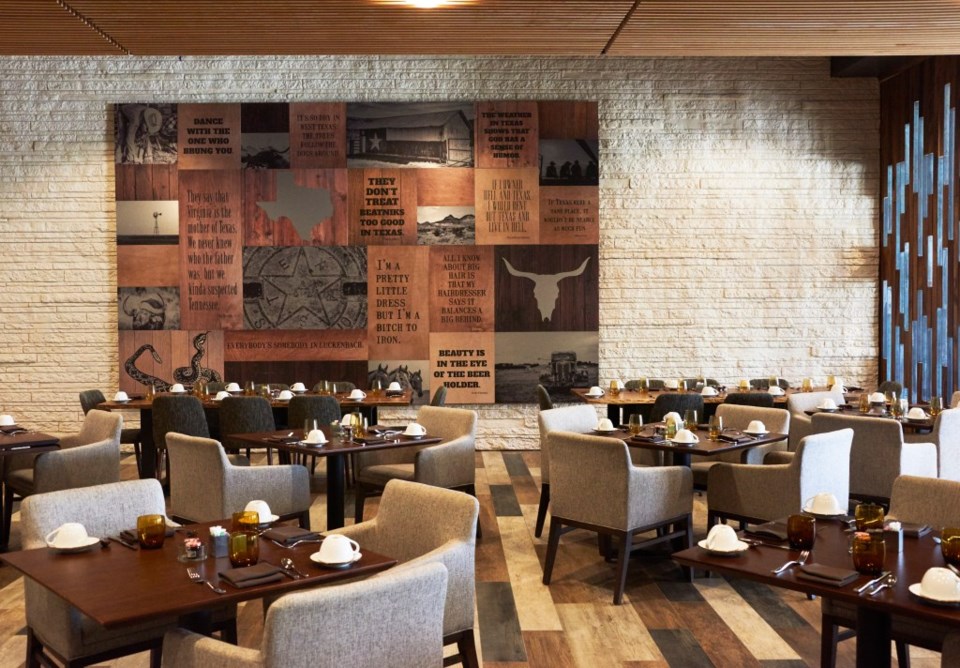
Stephan always comes back to his roots, to Big Spring and the Phillips 66 Truck Stop and The Stampede. He had them in mind when he built the first iteration of Stampede66 in Uptown, decked out like a dance hall with metal longhorns and stallions bursting out of the walls overhead. Stampede66 is wildly popular, so it surprised patrons when, a year or so ago, he made the unconventional choice to pack up the Uptown location and move to Allen, settling in Watters Creek, and leaving many of the day-to-day operations and menu in the hands of Chef de Cuisine Mikeal Frey.
It’s what he considers his form of retirement—licensing agreements like Stampede66 that let him train the staff and have fun with the concept, but leave the daily operation and the midnight-to-midnight schedule in the hands of someone else. Allen in particular, struck him as an untapped market in need of some revolutionary chef-driven cuisine.
“I think it’s what I want to do when I grow up,” he says, with a quick, small smile. Flora Street Café will be the last restaurant he owns outright, but that’s not to say that Stampede66 isn’t a Stephan Pyles restaurant. His influence is everywhere, from the sassy Texas quotes on the wall—“All I know about big hair is that my hairdresser says it balances a big behind,” (Ann Richards)—to the honey fried chicken.
Read more: The London Baker custom cake shop and bakery works sweet magic
Stephan explains that when a customer walks in, they should get an idea what they’ll eat and what kind of experience it’ll be from the start. Stampede66 in Allen, for him, is mentally patterned after his family’s café. It’s attached to a Marriott Hotel, so it’s not as in-your-face Texas as the original location was. Overall, it’s a masculine and sedate, square design with wide chairs, right angles and natural wood tables. If this is the modern cowboy’s dining room, he has turned in his chaps for suits, and can now afford not to wrangle his own beef.
“It’s the truck stop café I would have had if I had taste, control and money at the age of ten,” he explains.
The menu has Stephan Pyles originals, like honey fried chicken, and though it isn’t made the way his grandmother did, it still tastes right to him. Now it’s brined in salt for 24 hours, cooked sous vide for two hours, dipped in buttermilk and fried for only five minutes. Warm, local honey is injected into the flesh at the very end. The recipe for Mable’s biscuits hasn’t changed.
Chef de Cuisine Mikeal Frey has his own additions. Crispy smoked pork belly drizzled with Cholula, comes adorned with a light honey glaze and pineapple slaw. The spinach salad is a soliloquy of gorgonzola, fresh strawberries and candied pecans in a simple balsamic vinaigrette, just the right amount of sweetness. There’s the pleasantness of a well-blackened Asado chicken breast with hints of roasted poblano, and the unsurprising simplicity of a good, rare steak served with practically perfect roasted Brussels sprouts. But nothing compares with the grilled coriander pork chop, with an audacious spread of jalapeño jelly, that caramelizes on top in flecks of red and green. It’s a riddle well-worth unpacking.
Meanwhile, Stephan spends most of his time at Flora Street Café, an artistic space with thrilling presentations and an icon of the Dallas culinary scene. The kitchen is open, with a view straight into the mouths of the wood fires, and a black marble counter where diners can watch the chefs at work. Here, the Texas influences are sometimes hidden deeply: a flatbread spread with mascarpone, with figs, jamon serrano, arugula and—to Texanize it—red chili-infused honey. The menu is sensory and extravagant, with deconstructed tamales in dishes like martini glasses, and ceviches as elaborate as flower crowns. Toasted gnocchi pairs with spiced pepitas to highlight pasilla-braised rabbit; duck breast is delicately dotted with rich cherry agrodolce, which loop-de-loops from vinegar sourness, to sweetness and back again. It’s going in some new directions; this summer, Flora casualized itself and introduced a new brunch menu, as well as Fauna, an exclusive 16-seat tasting room.
This year, critics and culinary aficionados are buzzing about Dallas because Bon Appetit named Dallas its 2019 Restaurant City of the Year—even deeming us “no longer skippable!”
“We’ve always been proud of being this world-class cosmopolitan city and we weren’t necessarily. I have a saying, referring to Dallas,” Stephan says. “‘We’re finally becoming the city we always thought we were.’”
Even as he approaches some form of maybe-retirement, licensing out restaurants rather than owning outright, Dallas food, Texas food, and American food owe much to Stephan Pyles. Over the years, though momentum has pushed gradually upward, Stephan has seen the metroplex buck under the pressure of the Southwestern craze and buckle under recessions. As Dallas Observer recently noted, Pyles has “closed more restaurants than most chefs ever open.” He remembers the pride they felt in the ’80s, when for the first time, he and his friends were exporting fine cuisine, rather than importing it. He remembers the devastating closure of Routh Street Café, the triumphant comeback of Star Canyon—proving yes, he was still in the game, and yes, he could reinvent himself.
Without Stephan Pyles, it’s hard to say what the Dallas dining scene would even look like, his influence is so widespread. Not bad for a boy who bussed tables in Big Springs.
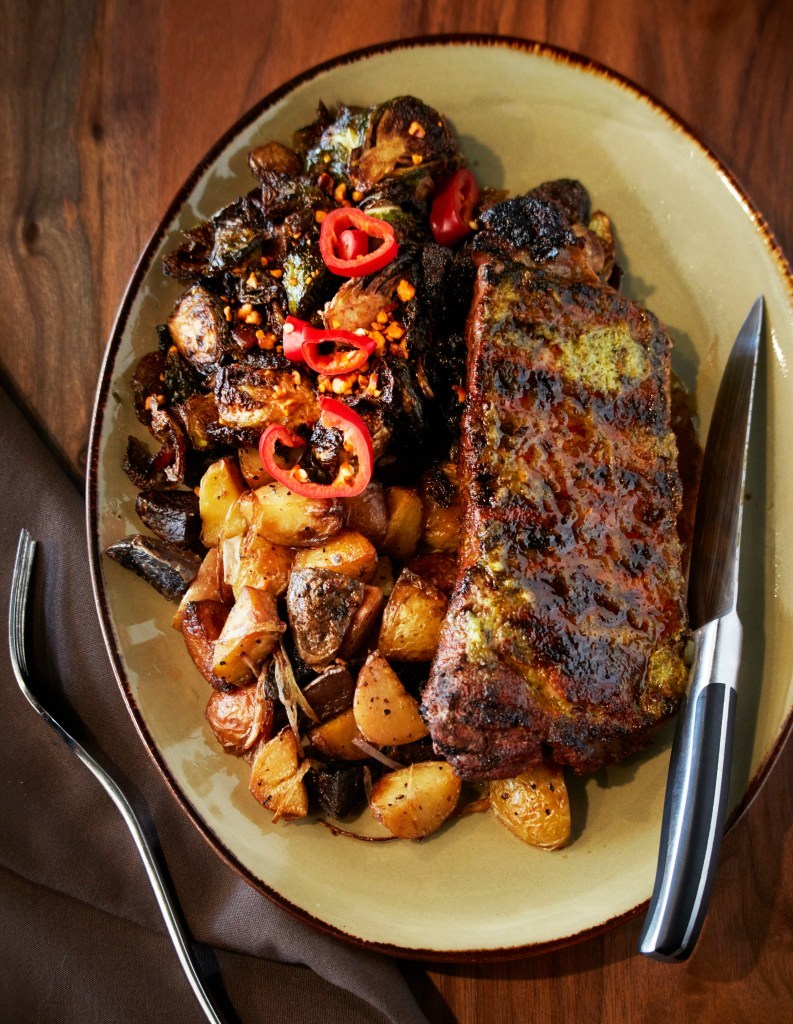
Stampede66
Hours: Every day | 6 a.m. – 2:30 p.m., 5:30 – 10 p.m.
Where: 777 Watters Creek Blvd. #2, Allen
More: 469.675.0800 | stampede66restaurant.com

